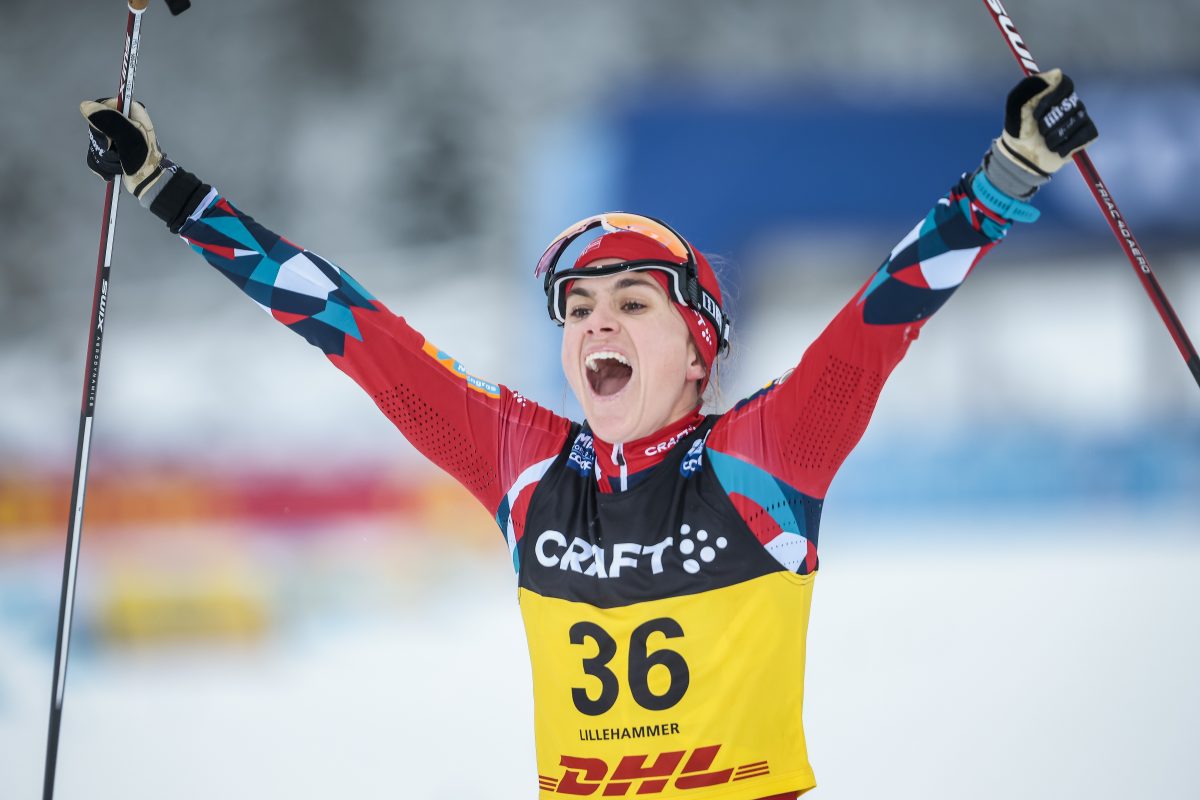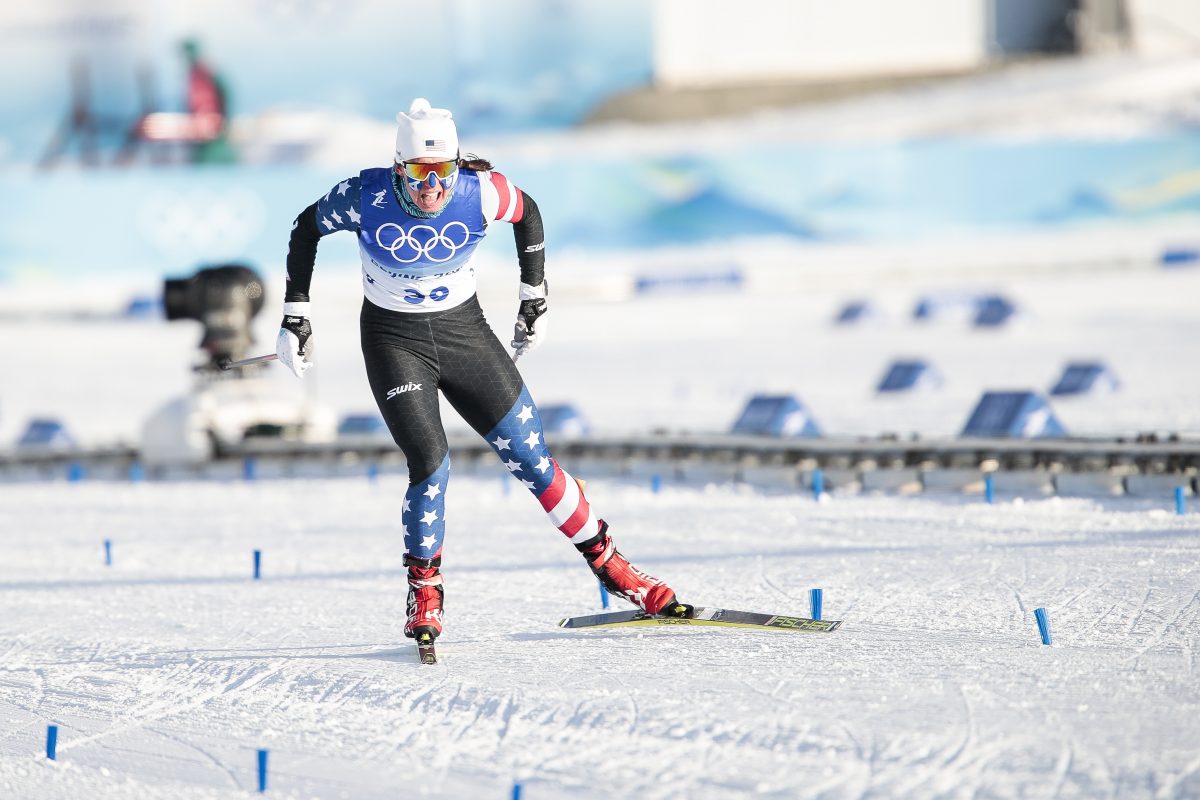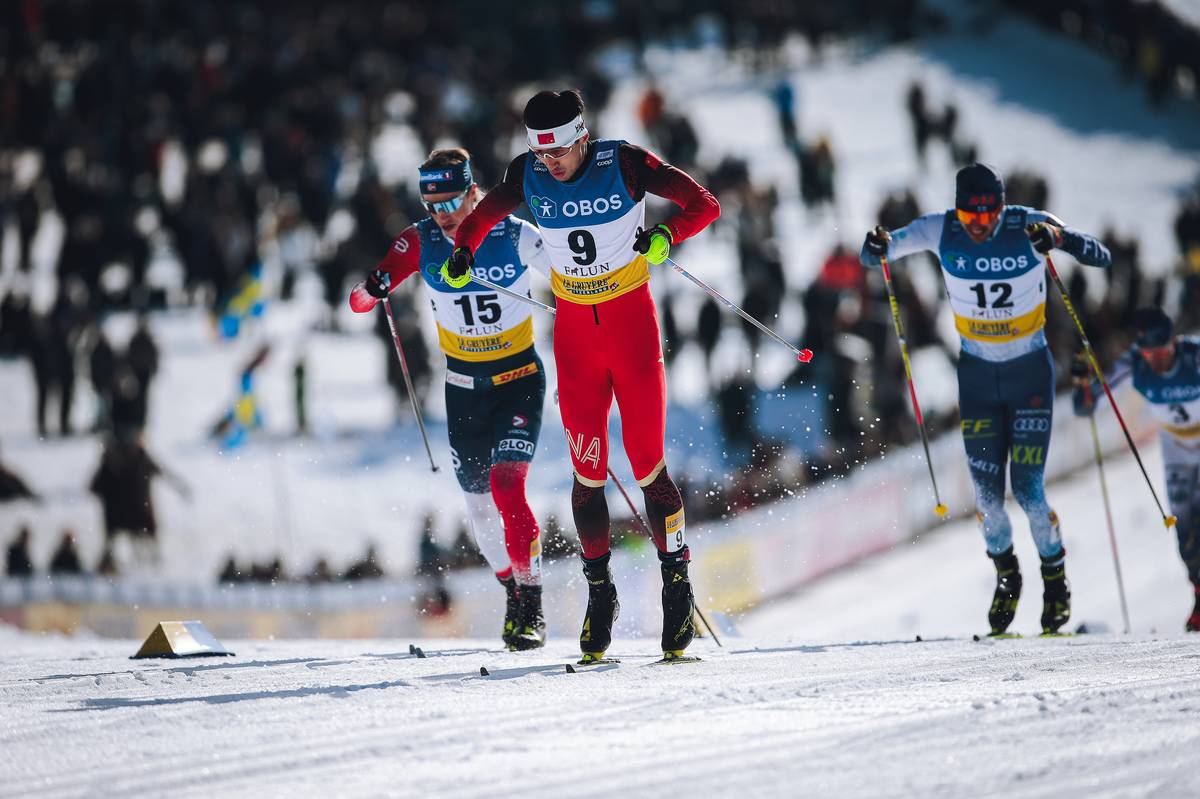Originally an alpine skier at Burke Mountain Academy in Vermont, Liz Stephen switched to Nordic in 10th grade. In her six years as a Nordic skier, Stephen has quickly ascended the ranks of Nordic competition under the coaching of Matt Whitcomb and the support of her teammates at Burke as well as on the U.S. Ski Team.
In 2008 Stephen clinched the bronze medal at the U23 World Championships and 2nd place at the USSA SuperTour. Stephen credits her family and the supportive ski community at Burke for her success at Nordic skiing.
When Stephen is not skiing, she enjoys running, reading, writing, live music, dancing, and being with friends as well as a good game of ultimate Frisbee. Stephen plans to ski competitively until she is “not enjoying 90% of the time spent at it.” After her ski career, she aspires to work in the medical field. “Sport can be incredibly selfish,” believes Stephen, “…but if you are able to find a way to give it meaning, a reason to want to win besides the shiny medal at the end, then you can start to put away the selfishness.”
Birthdate: January 12, 1987
Hometown: East Montpelier, VT
Current Residence: Park City, UT
Ski Club: Burke Mountain Academy
Status on U.S. Ski Team: Continental Cup
Height: 5’2”
Sponsors: Rossignol, One-way, Toko, Rudy Project, Onion River Sports, First in Fitness, Morse Farm
Full Interview
When did you start ski racing, and what were some highlights of your young skiing career?
I grew up as an alpine racer, and in 8th grade enrolled at Burke Mountain Academy, a ski academy in the Northeast Kingdom of Vermont. When I was in 10th grade, I decided that I wanted to try Nordic skiing, not wanting to leave Burke, but not wanting to continue to pursue an alpine career any longer. I jumped on Nordic skis in West Yellowstone 6 years ago and have been there for every Thanksgiving since.
Who has been the most influential person for you, whether as a skier or a person?
That is a loaded question. I have been lucky enough to come across an immeasurable number of people who have had an impact on my life and on me becoming the person I am today. I was brought up in a household that was built on love and support, went to a school where community was the first focus, have coaches who are both incredibly informed and knowledgeable, as well as wonderful people. I have been a part of teams, in all sports I have competed in, and have been able to learn from my teammates by watching, interacting and supporting, as well as being supported, in all cases. I consider the upbringing I have had very influential to the person I am today, and it was a joint effort. I admire many, but Becky Scott is a person I aspire to be like. She found a way, through sport, to make a difference in others lives, big differences in others lives. I do aspire to be like that. Sport can be incredibly selfish and that can wear on an athlete, but if you are able to find a way to give it meaning, a reason to want to win besides the shiny medal at the end, than you can start to put away the selfishness.
Where is your favorite place to ski, where is your favorite place to race, what is your favorite part of the season, what are your favorite ski conditions?
My favorite place to ski is probably the Windy Ridge loop in West Yellowstone. Favorite place to race is probably Soldier Hollow. My favorite part of the season is the spring races and my favorite ski conditions are when there is a light powdery snow in the tracks.
What drives you to succeed at the highest possible level, and what are your short term and long-term goals as a skier?
The curiosity I have to see how hard I can push myself, and wanting to give my all in what I have chosen to do with my life at this point. In terms of goals, I want to continue to improve in my skiing, I want to be a good ambassador for Nordic and a good role model, and I want to continue to enjoy skiing for as long as I chose to pursue it.
Do you have any consistent training partners? Do you prefer training alone or with others?
My training partners are usually my team, but it is not consistent, since we all train in different spots during the year. My consistent training partners are usually my coaches that live in the Park City area. They tend to come on a lot of the workouts with me in the summer months. I enjoy training by myself, but I love training with others.
What is your favorite on snow and dryland workout?
OD’s, classic in the winter, running in the offseason.
What do you enjoy doing besides skiing?
Running, reading, writing, live music, dancing, being with friends.
Have you always wanted to be a professional ski racer?
No. It has just happened that way. I knew I wanted to keep pursuing skiing which is one reason I went to Burke Mountain Academy, but being a professional ski racer just happened to be the next step after I left Burke.
Do you enjoy international ski racing? What is it like to travel to different countries to ski race? Do you find it much different than racing in the U.S.?
I love racing internationally. Don’t get me wrong, I like racing in the states too, but racing in Europe is just a different experience. People are fired up to go watch a cross country ski race, which is not always the case here. So, it is just a different and exciting experience.
How was U23s last year? The Americans, especially the women had success there. Do you have great hope for the future of women American skiers in the near future?
Yes. Great things are coming, for sure. We had 3 women in the top 4 until the last turn in the 15K skate at U23’s. A crash with a half a kilometer to go put us out of the running for 3 in the top 5, however, having skied virtually the whole race with 2 of my teammates speaks to the improvement we have made as a young team.
If you don’t end up ski racing for a career, how would you be employed? What is your dream job?
I admire doctors, though the amount of time one spends at his/her job is daunting, but I admire what they put into their job. So, dream job, I would love to be a doctor, but I don’t think I will ever be one. I would however love to do something in the medical field that would keep me traveling for my job.
How long do you think you will ski professionally, if you do? What do you see yourself doing after you finish your ski career?
I have no concept of how long I will be at this, though I do hope to be skiing for my whole life. I will do this until I am not enjoying 90% of the time spent at it. There are always going to be times where getting out the door is not a hop, skip, and a jump, but when it becomes overwhelming to get out the door day after day, I will walk away.
How did you rise so quickly through the ranks of American skiers? Was there a specific turning point?
Some things just click. I grew up as a runner, so I had some endurance base going in, but Nordic just seemed to fit with me.
You raced for Burke Mtn. Academy in high school. How was your time there, and how did you develop as a skier?
Matt Whitcomb was my coach there and continues to be one of my coaches today, and his love for the sport was contagious to our team. I had a wonderful experience at Burke and what I learned during my time there were some of the most important lessons; team, community, trust, support, work ethic and to love what you do. I developed as a skier watching, following my teammates and Matt, listening, and working hard.
Do you enjoy racing/competing in other sports during the offseason, or did you play other sports as a kid? What are some favorite non-skiing competitions?
I was way into cross country running through middle and high school as well as alpine racing through 10th grade. Up until then I played every sport that was offered in Elementary school. T-ball, softball, soccer, basketball (for a short stint), I was just a normal kid. I love watching marathons, baseball, and track and field. I compete in a running race whenever I can, though it is not nearly as often as I would like. A good game of ultimate Frisbee is always on my short list of games to play too.
How do you pass the time while traveling? Do you have an essential item that you bring with you everywhere?
A book. I read to pass the time, and I check out the area that I am at. I also do crossword puzzles with Morgan Arritola while I am on the road. I don’t do them on my own because I get stumped too quickly, but Morgan is good at them, so when I get stumped, I simply hand it over to her for a while. It’s a good team effort, or more like 4/5ths her, 1/5th me.
What does your diet consist of? Do you have a favorite pre-race dinner and breakfast? Do you enjoy eating foreign food when you travel?
My diet consists of eating plenty of food, red meat to keep my iron stores up, calcium to make my bones strong (and I am still hoping I will grow a bit more). I eat whatever I can for dinner the night before, preferably something with plenty of carbs, but I have had some of my best races on weird dinners the night before. Plain old oatmeal for breakfast is usually what I do.
What’s one thing people would be surprised to know about you?
That is a good question. I am a loud person and tend to tell all of my secrets right off the bat so I can’t think of anything at the moment.
What, if anything, do you do besides ski? How do you spend your weeks off?
I have a part time job as a barista in the summers and am hoping to take some classes again next summer, try to keep the “school brain” working. I am hoping to spend this spring backcountry skiing and backpacking with some teammates and friends. I usually walk away from Nordic for a couple of weeks in April, just get away and refresh the mind and body before starting up again. However, if there is a good crust ski or some nice conditions, I may head out on the skinny skis for a day.
How has the transition to the U.S. Ski Team gone? Has there been a major change in your life?
The transition has been easy. Like I said, Matt Whitcomb is still one of my coaches, so there is consistency there. Since I have been on the team, all of my coaches have been the same. I am still skiing on a team, just a different one, and one that carries with it certain responsibilities, such as being as professional an athlete as you can be.
Do you have a message for aspiring young skiers? How does a young skier get to where you are now?
Love it, find a team to be a part of with a knowledgeable coach and kids who are serious about being the best they can be, educate yourself, push your limits, and train, train, train. You will get there.





